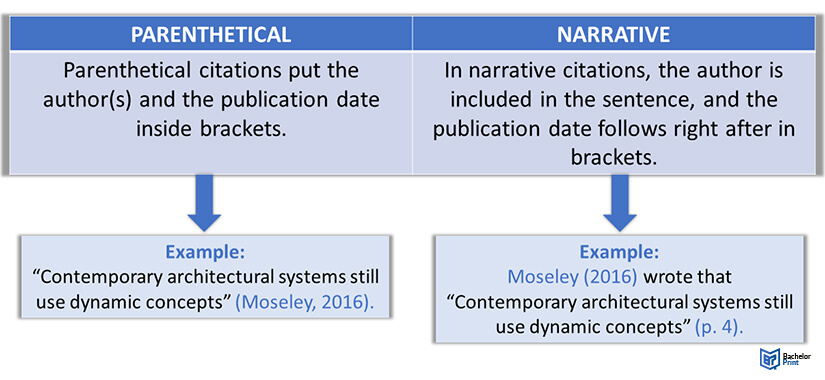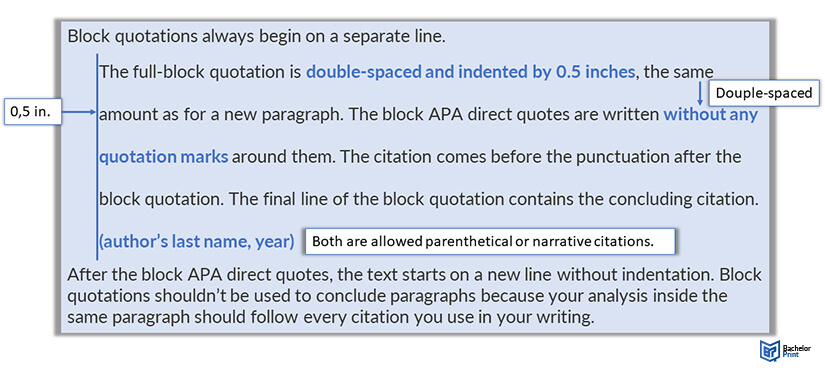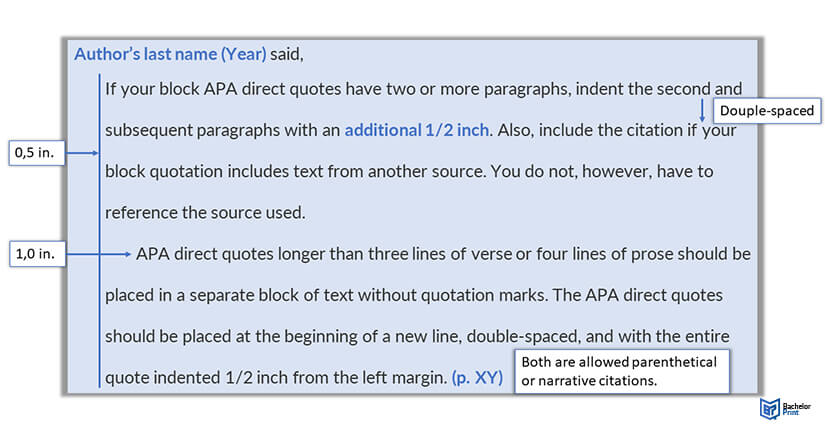
When creating your research paper, it’s crucial to avoid plagiarism, which is identifiable when directly replicating someone’s words or core concepts. With the APA style, it’s commonplace to utilize direct quotations; these are exact phrases from the source text. Hence, it’s advised that students employ careful strategies when incorporating these quotations into their work. Additionally, it’s important to remember that understanding and appropriately using the APA citation style can greatly minimize the risk of plagiarism.
Definition: APA direct quotes
Direct quotations are taken verbatim from the source. APA direct quotes are frequently used in the middle of a paragraph.
If you don’t use double quotation marks at the start and conclusion of a quote, utilize the exact words from the source material, and cite your sources correctly, your work can be mistaken for plagiarism.
When citing APA direct quotes, you must always include:

in Your Thesis
Citing APA direct quotes
You must provide an in-text citation when you make references to sum up APA direct quotes or to paraphrase another source.
There must be a reference list record for each in-text citation used in your essay.
Parenthetical and narrative in-text citations are both acceptable in this style of presenting APA direct quotes.

APA direct quotes without page number
In order to properly credit a source, you must include the passage’s precise location in your APA in-text citation whenever you use APA direct quotes or paraphrase a specific passage. If the material is lengthy and there are no page numbers (as when citing a website), you can use
- paragraph numbers
- section headings
- a combination of both
A timestamp is a string of characters or encoded data that indicates the time and date of an event occurrence. It typically includes the date and time, but can also be accurate to a small fraction of a second. When referencing a video or audio source and need to highlight a particular section, include a timestamp in your APA in-text reference. Specify only the timestamp from the beginning of the passage you are quoting.
APA direct quotes: More than 40 words
APA direct quotes of 40 words or more should be placed in a block of freestanding typed lines without quotation marks. Place the quotation at the beginning of a new line, 1/2 inch from the left margin, just as you would a new paragraph.
In order to properly format block APA direct quotes, the following is required:

Note: block APA direct quotes should be used sparingly. Block quotations tend to take over the paper’s voice, often overshadowing the author’s voice with that source’s voice. Instead, if at all possible, try to quote smaller portions of the piece of text and incorporate these into your voice. This practice will allow you to establish your voice as the author and show how you engage with the information, not just report it.
Multiple paragraphs in block quotes

Altering APA Direct Quotes
Use square brackets rather than parentheses for anything like a comment or explanation you’ve added to a quotation. Use italics to draw attention to a particular word or words within a quotation. Put “emphasis added” in square brackets below the italicized text, like in this example: [emphasis added].
Shortening APA direct quotes
By deleting words, phrases, or sentences and replacing them with an ellipsis, you can condense a text if some of its sentences are pointless or unnecessary. Before and after the ellipsis, leave a space and ensure that omitting the terms doesn’t alter the intended meaning.
Adding words/phrases to APA direct quotes
Square brackets—[]—denote changes made to direct quotations when new words are added or removed. The words enclosed in the brackets, usually used in pairs, help integrate the quote into the writer’s phrase, clarify the meaning, or give a brief explanation.
Correcting APA Direct Quotes
Using brackets, you can modify or add words to APA direct quotes. Changes can be made to fix tense or add crucial details. Pronoun consistency inside a quote can also be achieved by using brackets. However, brackets shouldn’t be utilized to alter the quote’s meaning.
FAQs
A complete citation with the page number must always be included for APA direct quotes in the same sentence (or other location information, e.g., paragraph number). Include a parenthetical citation either directly after the quotation or at the end of the sentence.
Before the list, use a signal phrase to introduce the source in your text. The list should be single-spaced; you can put any word changes or additions in brackets. Put a citation after the final item in the list and if the list ends with a period, put your citation after that. This is a crucial approach when attempting to pull off APA direct quotes.
Place parenthesis containing the APA direct quotes’ author, publication year, and page number(s) after the passage. Put a “p.” before the page number if the quotations are one page long.
